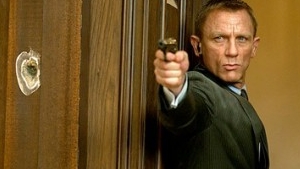 Even after 4 years, Quantum of Solace still leaves a rather bland taste in mouths of Bond fans (though much of the flat reception the film was met with can be chalked up to the writer’s strike). As such, Bond would have a lot of making up to do in his next outing. But thanks to another solid turn from Daniel Craig, a fantastic cast to play opposite, great story, music and all of this under the artistic eye of Sam Mendes, Skyfall is not only one the franchises’ best installments but easily sits among the likes of the most beloved Connery films. Sounds like lofty praise but really it earns and deserves every bit of it.
Even after 4 years, Quantum of Solace still leaves a rather bland taste in mouths of Bond fans (though much of the flat reception the film was met with can be chalked up to the writer’s strike). As such, Bond would have a lot of making up to do in his next outing. But thanks to another solid turn from Daniel Craig, a fantastic cast to play opposite, great story, music and all of this under the artistic eye of Sam Mendes, Skyfall is not only one the franchises’ best installments but easily sits among the likes of the most beloved Connery films. Sounds like lofty praise but really it earns and deserves every bit of it.
From the gripping, and fast-paced intro (which recalls Casino Royale‘s spectacularly reckless free-running sequence) and theme song by Adele (which oozes nostalgia), Mendes sets the stage for a very special Bond movie. Combining familiarity with an air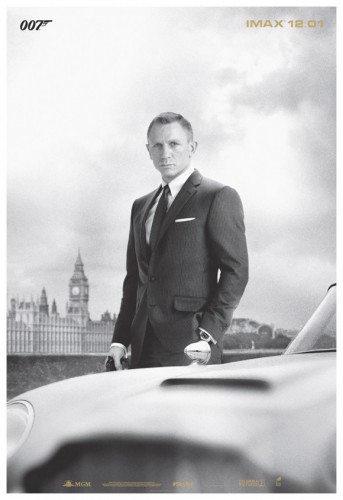 of contemporary spirit, Craig’s third at bat (his Goldfinger if you will) will not only please fans but be a benchmark for the series. We begin, like many films in the franchise following Bond mid-mission but forgoing the trademark gun barrel entrance we see Bond in a new light, literally silhouetted by the light at the end of a corridor. Like a dream this ghost-like figure materializes into the super spy we’ve grow to love. Artistically it’s like the birth of a new Bond, a better Bond and a Bond we’ll talk about for years.
of contemporary spirit, Craig’s third at bat (his Goldfinger if you will) will not only please fans but be a benchmark for the series. We begin, like many films in the franchise following Bond mid-mission but forgoing the trademark gun barrel entrance we see Bond in a new light, literally silhouetted by the light at the end of a corridor. Like a dream this ghost-like figure materializes into the super spy we’ve grow to love. Artistically it’s like the birth of a new Bond, a better Bond and a Bond we’ll talk about for years.
When the Brosnan films, in attempt for Bond to “go big or go home”, became parodies of themselves the future of 007 looked bleak. It prompted the question: Could a spy film work in today’s cinema without making it another throwback story involving a corrupt dictator(s) or cold-war themes? After all, what we’re used to seeing are the dastardly brilliant and elitist Bond villains playing a global chess match that attempt to pit nations against one another and/or induce nuclear war right? But Skyfall proves that you can teach an old spy new tricks and with the right creative team, Bond can stay relevant and believable.
As M (Judi Dench) points out in the film, these kinds of agents are necessary because today’s enemies can’t be identified on a map. To drive that idea home, the entire subplot of the story (the British government attempting to publicly brand MI6 as archaic in a sort of congressional hearing) culminates with the antagonist (Javier Bardem) literally bursting in on the very same hearing the pencil pushers were holding prove these kinds of villains/terrorists didn’t exist. It shows that Skyfall is steeped in real world issues (which in that sequence makes the movie very meta) and not about the lasers or henchmen that populate the series’ earlier catalog. Different era, different Bond and we, contrary to The Dark Knight, are getting a Bond the we both need and deserve.
Bond’s journey over these 5 decades has come to this; explaining how it all started and tells a story about a damaged set of characters that are not cardboard cutouts and the previously secondary roles are equally as important as the titular hero. First of which is a young Q (brilliantly played by Ben Whishaw) making his debut in this series. From the get go, whilst channeling Desmond Llewelyn, he lays the ground rules for the relationship they’ll have for years to come. His exchange and delivery is razor sharp and, like M, is less than impressed having to deal with the arrogant spy as he hands over Bond’s first official and quote unquote gadget. Even as a fresh face in the Q-branch, the subtext of this memorable exchange is basically “oh, grow up 007″ and yet still there’s a playfulness and respect (similar to Zachary Quinto and Chris Pine when playing younger versions of equally iconic Spock and Kirk in J.J. Abram’s Star Trek) that hints at their reluctant but steadfast friendship ahead.
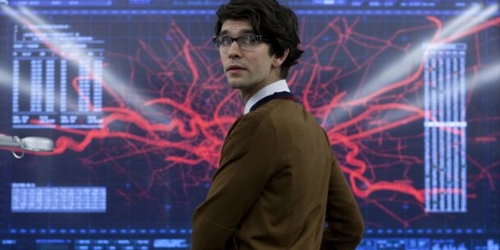
Mendes’ film trades judo and rocket packs for rich, colorful characters (well muted is more appropriate, they are English after all) and if Skyfall is to be compared to Goldfinger and Goldeneye, then Silva (Javier Badem) will easily and rightly sit as one of the most memorable villains for years to come. He has a Hannibal Lecter level of vile brilliance, complexity and lethality which keeps him one step ahead of Bond and MI6 and his intensity is highly palpable and unsettling. He has real and somewhat relateable motivations and while the film is full of callbacks to previous Bond films he’s the most three dimensional bad guy because he feels like a real character. But one who’s all business. There are no quips (though his intro/monologue is one for the ages), no quarter, just blunt force trauma exacted with surgical precision and the only joy he finds is in his plan’s execution. That’s credit to Neal Purvis, Robert Wade and of course Bardem for bringing it all together.
This is perhaps the most mature Bond we’ve seen but it still has the fun and mystique the franchise is known for. It, like Casino Royale, is far from suave (something we’ll likely never see saturate this series again) but Skyfall still successfully showcases a grand, lush even romantic (when it calls for it thanks to Roger Deakins) story. There’s a lot of old (tasteful nods and references) but also a lot of new and that’s in the form of other characters (not to mention some simply fantastic music from series newcomer Thomas Newman!). Naomie Harris and Bérénice Marlohe are “Bond girls” but they’re not relegated to the love em and leave em or stereotypical femme fatale stock. They still have small parts but they aren’t entirely disposable and it’s rather refreshing. If every modern film seems to take inspiration from (read: overly knock-off) the Nolan/Batman universe then Sam Mendes has done it selectively and respectfully. Imitation is the highest form of flattery but still Skyfall is its own entity and that, in this this cinematic climate where fans are ever-thirsty for originality, gives movie-goers something to celebrate.
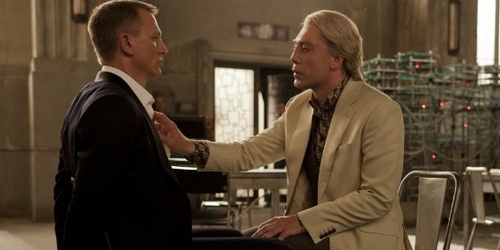
In the end credits we’re told, like many times before, that James Bond will return accompanied by a fitting 50th anniversary logo which serves two purposes. First it simply tells fans “thanks”; he wouldn’t be so spry and beloved at the half century mark if it wasn’t for them. Second is that there’s more where this story came from. Moreover it implies that Skyfall is a watershed in film/franchise history because Bond has reached the next stage in the evolution of his character. Most likely what we know is history, what we just saw is present (as in one hell of a gift to fans), and a promise of strong things to expect in the future.
G-S-T RULING:
Fans may lament the lack of 60’s era stories and cool toys but again, this, this is what the series needs. Not throwing out all disbelief but substituting exploding pens for realism is a very good and rather mature trade off. After all, Bond is 50 and it seems like he’s starting to act like it. The time for invisible cars and outrunning avalanches is over (though operating a crane on a moving train is still wildly fun cinematic excitement) as we look to a new age, a renaissance if you will, of the world’s greatest secret agent.
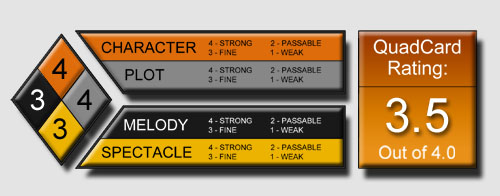
G-S-Talking point: I have an idea that there’s a direct correlation between Bond music and the story, specifically that the strength of the film depends on the strength of the song. Agree or disagree? Further, what’s your favorite Bond theme song??
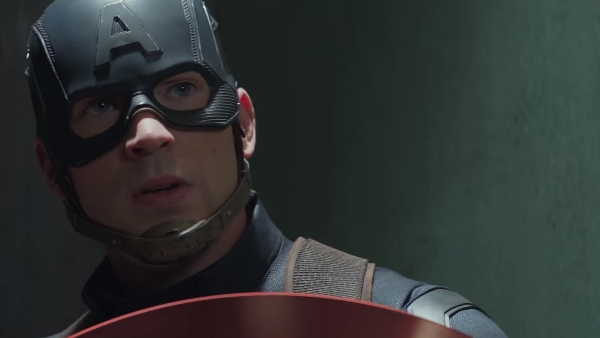
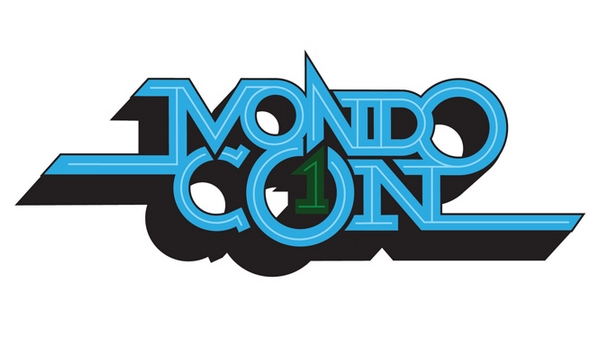
2 Comments
Andrew Crump
I had a similar-but-different reaction as you: I feel like the ending of Skyfall brings the character back to his roots, pushing us past the faux-realism of the Craig films and returning us to a point where the character assumes the mantle of former Bonds. For me, the movie reminds me of why Bond is such a great character by both peeling back the layers to examine the human side of him and also letting him have his Aston Martins and pithy one-liners and abrupt, random sexual encounters with strange women. No, there won’t be anymore exploding pens, but Skyfall knows that Bond can do extraordinary things and be in extraordinary situations and be fun and engaging without being absurd, and he can be human without being boring.
…basically I loved it.
RidgeRacer4
Good point about his layers. Picking up on what Campbell started with Royale, he’s given even more depth than the iconic but hollow cutout we’ve grown up with. That’s just good story telling catching up with modern film expectations. And yes, he still gets to have the perks of the job that make the series fun and attractive in the first place. Liken this to Bond, Year 1 and without saying the word reboot we get to start the fun all over again:P Those 4 words “James Bond Will Return” have never sounded so good or meaningful to me before now:)
I loved it too and am probably about as jazzed to be a fan as 11 year old me was watching Goldfinger for the first time!